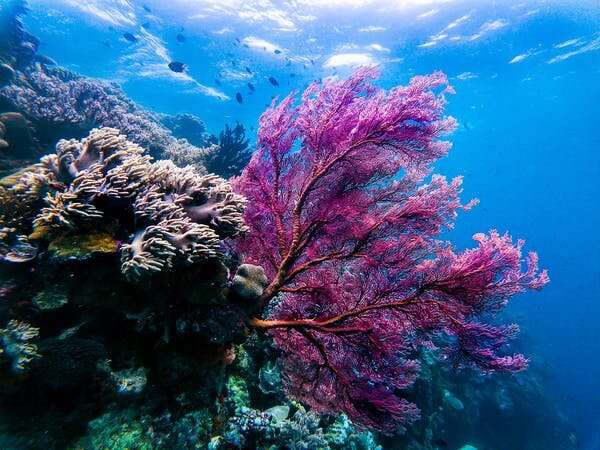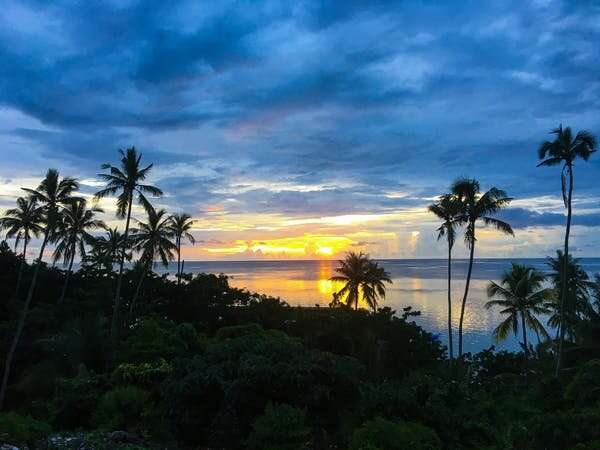Soft coral reefs in Tomia Island, Wakatobi National Park. Credit: Chloe King
The COVID-19 pandemic has wreaked havoc on the travel and tourism industry globally. Indonesia is no exception.
The tourism industry in the country with the fourth-largest population in the world has slowed down during the pandemic.
Foreign arrivals dropped by 75% from 16.11 million in 2019 to just 4.02 million in 2020. This was a hard blow to a tourism economy that supplied 5.7% of the country's gross domestic product and provided 12.6 million jobs in 2019.
To revive the industry, the Indonesian government has launched a new approach to promote high-end tourism.
High-end tourism is meant to combat the often unsustainable growth in mass tourism. It attracts fewer tourists who spend more on luxury trips than typical mass tourism experiences. In theory, this reduces environmental impacts while increasing economic benefits.
Our latest research in Wakatobi National Park, an area of immense marine biodiversity spread across four main islands in Southeast Sulawesi province, demonstrates the limitations of high-end tourism development.
While it may offer some conservation benefits, its inherently high price tag means it caters to the most privileged sectors of society, while the local political elite accrue the profits.
Tourism development must do more to focus on providing benefits for communities beyond just financial gains. It should support local communities to increase their skills and knowledge to equip them to be resilient to crises and economic shocks.
Unsustainable travel experiences
Our six-month research effort compared high-end, volunteer-based and community-based tourism operating in the marine-rich Wakatobi National Park. The aim was to see which form of tourism development best equipped communities to respond to crises like COVID-19.
Wakatobi National Park is part of a government initiative to develop "high-quality" tourism destinations across the country through its so-called "10 New Balis" program. This effort aims to accelerate tourism development in 10 new destinations beyond the country's top tourist destination, Bali.
According to interviews with the regional tourism office in Wakatobi, the local government has set a goal of increasing visitor numbers from 20,000 to 100,000 by 2025 by focusing on high-end tourism development.
Wakatobi National Park was designated as a national park in 1996 and covers an area of 13,900 square kilometers. The park has two foreign-owned dive operators on the islands of Tomia and Hoga, with local homestay operators proliferating throughout the park.
A high-end dive operator in the national park offered a valuable case study in exemplifying how exclusive and expensive tourism development has left communities less resilient and ill-prepared to face a crisis.
Guests pay between US$300 and US$1,000 per person for a single night stay. The operator is able to use these fees to pay each village around Tomia (17 in total) between Rp 1.25 and 7 million (about US$85-475) each month in exchange for halting destructive fishing practices and avoiding fishing on 30 kilometers of reef, including a no-take zone. Local dive operators cannot take guests on or near the resort's reef.
Sunset in Tomia, overlooking reefs currently under fishing restrictions from the private dive operator. Credit: Chloe King
While this has significantly protected and improved natural resources and financial capital, local fishers and dive operators alike lost agency and ability to use the reefs.
Additionally, other respondents noted that the payments did not reach the community directly. The Badan Permusyawaratan Desa (BPD), considered the "parliament" of local villages in Indonesia's new era of regional autonomy, controls the money.
Respondents felt they did not have a say in how the BPD spends the money it receives from the high-end dive operators.
Respondents alleged it benefited the local "political elite" in the BPD as the politicians spend the money based on "their will, not the will of society."
"What [the high-end operator] does is right, with their regulations and money, but they have a greater responsibility to society. Society does not need the money, we need the skills. If they just give money, it will only benefit the political elite," one respondent said.
Due to the exclusive and closed-off nature of the resort, guests rarely interact with the local community. This was frequently cited as a point of frustration.
Intercultural exchange and informal interaction facilitated through home-stay operators help to increase human capital and community skills. With high-end resorts, this interaction is rare.
Furthermore, no local people from the national park had been trained as dive guides during the 25 years the foreign operator was in business. Few respondents were able to identify opportunities for upward mobility and skills training for local staff.
Such tourism development is reminiscent of colonialist structures that pervade Indonesia to this day, through the acquiescence of rural elites to extract profits and control resources, whether through exploitation or today's modern modes of conservation.
Tourism for all
High-end dive tourism models, where marine reserves are privately financed and enforced, may have led to critical and obvious gains in marine biodiversity and conservation success.
Misool in Raja Ampat, in the most eastern island of Indonesia, is another example of an area that has seen substantial biodiversity benefits. The total biomass of the marine reserve increased by 250% over just six years due to a similar luxury tourism model.
However, for whom are these resources being conserved? What is being made to be resilient, and why? Suppose the answer is to drive future tourism growth, limited to those wealthy enough to provide and access such "high-quality" tourism experiences. In that case, we must return to view the crisis at hand.
With tourism at a standstill for more than a year, local communities have been left to face the consequences without opportunities to increase their skills and knowledge, which would have helped ensure their resilience to such a crisis.
Emerging into a post-COVID-19 landscape, where climate change threats loom large in the communities where tourism once boomed, tourism must first and foremost be developed with local communities in mind.
As one respondent said in a focus group discussion: "[People from capital] Jakarta wants to develop only high-end tourism, but I don't agree. Tourism should be for everyone to come, not just the rich."
Provided by The Conversation
This article is republished from The Conversation under a Creative Commons license. Read the original article.![]()

























